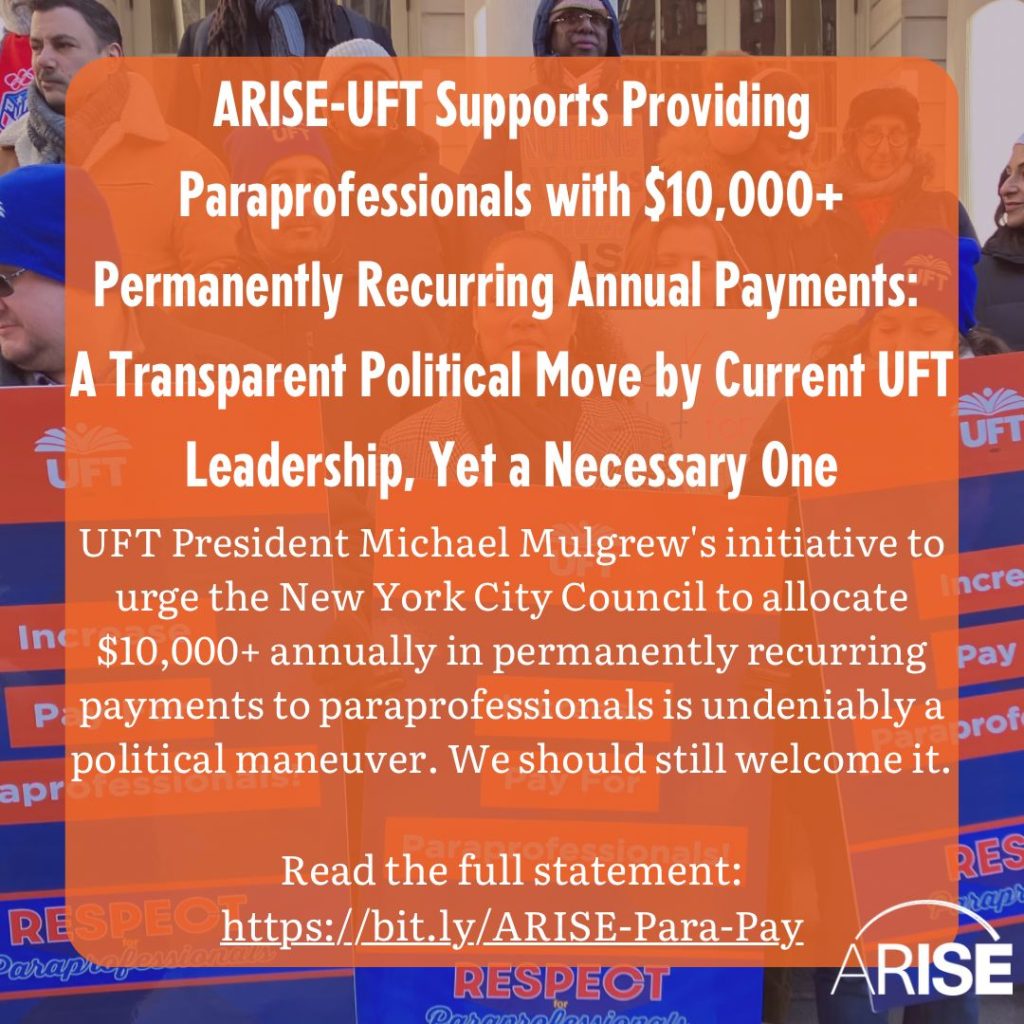ARISE-UFT Supports Providing Paraprofessionals with $10,000+ Permanently Recurring Annual Payments:
A Transparent Political Move by Current UFT Leadership, Yet a Necessary One

UFT President Michael Mulgrew’s initiative to urge the New York City Council to allocate $10,000+ annually in permanently recurring payments to paraprofessionals is undeniably a political maneuver. We should still welcome it.
Paraprofessionals are the UFT’s most underpaid members. They do vital work for our highest need students, but are not paid even close to a living wage. Not only does this make it nearly impossible for paraprofessionals to make ends meet in New York City; it has led to a huge staffing shortage. Too many students with special needs are not getting the services they need, because many paraprofessionals choose to leave the classroom so that they can better support their families.
In some ways, our own union has enabled this issue, supporting programs to help paraprofessionals become teachers instead of also working to make paraprofessional wages high enough in their own right. They have also failed to successfully challenge or reform pattern bargaining, a system by which all City employees get roughly the same wage increases. New strategies are needed. Other city unions facing staffing shortages, like the New York State United Nurses, successfully organized and mobilized rank and file members in an escalating contract campaign of job actions, marches and civil disobedience in hospital lobbies to win historic gains well beyond the pattern.
In the last contract, pattern increases were set to around 3%. Per the official UFT FAQ, this means that a “3% increase for a starting paraprofessional is roughly $900, while for the highest paid principals it is roughly $6,500.” The dilemma is clear – in absolute terms, lower paid workers get less, literally, with pattern bargaining. And that problem is exacerbated by the fact that patterns for municipal workers in New York City have been astoundingly low. Our last increase was sub-inflationary, meaning that all employees, but especially our lowest paid workers, effectively committed to an inflation-adjusted pay cut with the 2022-2027 contract.
UFT leadership rightfully deserves criticism for not better advocating for our members to receive the wages we deserved in the last contract. Blaming DC-37, the union who technically set the pattern for wage increases, is an abdication of duty. We should have organized with our union partners to set a better pattern for municipal workers. This is possible: In the nation’s second largest school district, Los Angeles, the teachers united with SEIU paraprofessionals by preparing for and winning a citywide strike that earned 30% wage gains for paras. A better pattern, while not solving all of the inequities for paraprofessionals, would have significantly boosted their salaries, as well as other titles who don’t make enough (like OT/PTs, who make significantly less than teachers, despite needing expensive advanced degrees in order to do their jobs). Instead, paraprofessionals and other rank and file members on the contract negotiation committee were given explicit instructions not to negotiate pay and longevity.
Some have suggested that during the most recent contract negotiations, UFT leadership should have taken money meant for all titles and diverted them only to paraprofessionals. But, that probably would not have been the most prudent solution. Teachers, counselors, OT/PTs, and other titles, who themselves are underpaid, would have suffered from receiving less than the already sub-inflationary established pattern. Therefore, Mulgrew’s decision to seek alternative means to secure a raise for the most underpaid workers, outside of conventional pattern bargaining, is not a bad one. If successful, doing so would get paraprofessionals a raise without taking much needed dollars from other struggling UFT members. And it will take mobilization and organization of our membership to make this proposal a reality.
Some have also suggested that we should reject the $10,000 ‘bonus,’ because it is not pensionable. It is true that the money Mulgrew is trying to get to paraprofessionals would not be pensionable, which would be ideal for retirement purposes. However, the money would still provide immediate financial relief to those who need it most. Waiting for a protracted resolution of pattern bargaining would not. The immediate injection of cash still alleviates real financial strain and does not stop the UFT from finding other, pensionable, ways of addressing paraprofessional pay in the future.
Finally, some have criticized Mulgrew’s move to get paraprofessionals higher pay as mere campaigning. And yes, we must concede that the timing of this initiative, coinciding with an election, feels transparent. Mulgrew clearly wants to divert the paraprofessional vote from opposition groups back to Unity, which may be one reason the move is being announced before there is even a written bill – let alone a sense of whether or not it will pass. Moreover, there are concerns about the bill itself. Might it set a precedent that could potentially divert city funds away from UFT titles or the education budget in the future? Might the label of ‘permanently recurring payments’ turn out to be too good to be true after a budget hearing somewhere down the road? Perhaps, perhaps not. Despite these concerns, it is crucial to recognize that this move to get paraprofessionals much needed extra compensation is fundamentally beneficial for paraprofessionals right now, and should be championed.
Therefore, all UFT members should rally behind this proposal, facilitate its passage, and hold the Unity Caucus leadership accountable for ensuring that the promised funds actually reach paraprofessionals. We can still demonstrate how alternative approaches, such as reforming the Taylor Law, contesting aspects of pattern bargaining, and improving union organization for collective actions, can lead to substantive pay increases and benefits for paraprofessionals and other titles. That is something ARISE would do, and such actions are the only way to make long-term solutions happen for the full breadth of under-compensated UFT members.
But, while it is easy to criticize UFT leadership for their reliance on political actions over traditional union organizing, and even easier to criticize them for making transparently political moves, it is imperative to acknowledge and support any measures that have the potential to yield tangible benefits for our most underpaid workers. The move to secure $10,000 permanently recurring annual payments for paraprofessionals is a step in the right direction, and it deserves our full support.



Leave a Reply